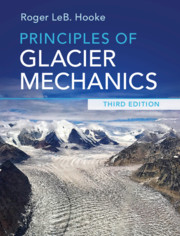Book contents
- Principles of Glacier Mechanics
- Reviews
- Principles of Glacier Mechanics
- Copyright page
- Dedication
- Contents
- Preface to the third edition
- Preface to the second edition
- Preface to the first edition
- Physical constants relevant to ice
- Derived SI units and conversion factors
- 1 Why study glaciers?
- 2 Some basic concepts
- 3 Mass balance
- 4 Flow and fracture of a crystalline material
- 5 The velocity field in a glacier
- 6 Temperature distribution in polar ice sheets
- 7 The coupling between a glacier and its bed
- 8 Water flow in and under glaciers: Geomorphic implications
- 9 Stress and deformation
- 10 Stress and velocity distribution in an idealized glacier
- 11 Numerical modeling
- 12 Applications of stress and deformation principles to classical problems
- 13 Ice streams and ice shelves
- 14 Finite strain and the origin of foliation
- 15 Response of glaciers to climate change
- 16 Ice core studies
- Problems
- References
- Index
1 - Why study glaciers?
Published online by Cambridge University Press: 20 December 2019
- Principles of Glacier Mechanics
- Reviews
- Principles of Glacier Mechanics
- Copyright page
- Dedication
- Contents
- Preface to the third edition
- Preface to the second edition
- Preface to the first edition
- Physical constants relevant to ice
- Derived SI units and conversion factors
- 1 Why study glaciers?
- 2 Some basic concepts
- 3 Mass balance
- 4 Flow and fracture of a crystalline material
- 5 The velocity field in a glacier
- 6 Temperature distribution in polar ice sheets
- 7 The coupling between a glacier and its bed
- 8 Water flow in and under glaciers: Geomorphic implications
- 9 Stress and deformation
- 10 Stress and velocity distribution in an idealized glacier
- 11 Numerical modeling
- 12 Applications of stress and deformation principles to classical problems
- 13 Ice streams and ice shelves
- 14 Finite strain and the origin of foliation
- 15 Response of glaciers to climate change
- 16 Ice core studies
- Problems
- References
- Index
Summary
Glaciers once covered 30% of Earth’s land area, leaving diverse landforms; glacial geologists study glaciers to understand the formation of these landforms. Glacier ice is a metamorphic rock deforming at temperatures close to the melting point; structural geologists study glaciers to learn more about the origin of similar structures in other rocks. Ice cores from glaciers contain a well-dated record of climatic fluctuations over millennia, so climatologists study glaciers to understand the drivers of Earth’s climate. Failure of glacier dams can cause floods that engineers and town officials seek to prevent. Anthropogenically induced global warming is causing retreat of ice sheets and mountain glaciers; planners and policy makers want to know how to stop this retreat, and how fast it will raise sea level, impacting coastal infrastructure. A quantitative understanding of the physics of glaciers is essential for rigorous analysis of many of these problems. Glaciers occur in spectacular remote areas, unscarred by human activities; these environments appeal to many glaciologists.
- Type
- Chapter
- Information
- Principles of Glacier Mechanics , pp. 1 - 4Publisher: Cambridge University PressPrint publication year: 2019



